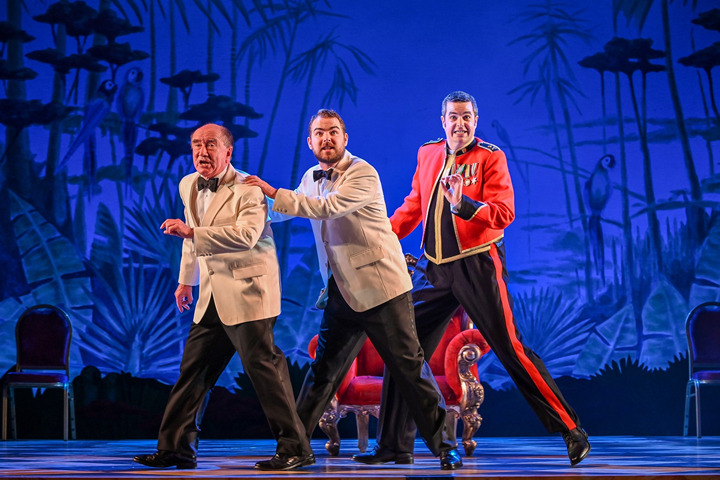| Opera Reviews | 19 April 2024 |
Sophistication and wit are at the heart of Utopia, Limitedby Catriona Graham |
|
Gilbert & Sullivan: Utopia, Limited
|
|

|
|
|
It starts with a lilting overture that would not be out of place in the New Year’s Concert from Vienna, but this is only the first clue that Utopia, Limited, the last of the Gilbert & Sullivan operas to be written and composed, is a bit different from the earlier operas. Neither is the overture a preview of the main tunes to be heard later. This may be why the opera is not better known, or it may be that there is less silliness masquerading as comedy and a lot more satire which, after nearly 130 years, is just as relevant as it was then. Briefly, King Paramount the First, of Utopia is totally dominated by his two scheming and corrupt advisers, his younger daughters have been trained in an affected demureness by an English governess. His eldest daughter is coming home from England, bringing with her the Flowers of Progress – representatives of the institutions which have made England great and, it is hoped, will do the same for Utopia. Scottish Opera’s director Stuart Maunder’s and designer Dick Bird’s staging is at the elegant end of minimalism – a stylised ‘tropical’ backdrop in blues and greens, a raised chequerboard dais, a throne-like armchair and a few hand chairs. The ladies’ chorus wear elegant full-length gowns, the men black shirts and trousers. The ensemble is excellent – from the languor of the opening chorus to the Act 2 Finale – and chorus and cast cope admirably with such unsingable lines as ‘the Joint Stock Company’s Act – the Act of Sixty Two’. Captain Fitzbattleaxe, of the First Life Guards (William Morgan) has the best bit – the wonderful Act 2 tenor solo lamenting the difficulties of singing high notes when in love; there is a delicious Tarzanesque ululating attempt at one high note. Ellie Laugharne, the soignée, Girton-educated eldest daughter Princess Zara, masterminds the transformation of her homeland and her affair with Fitzbattleaxe with a light and supple voice. Mark Nathan smarms his way through Mr Goldbury’s explanation of how to set up and run a company. Captain Sir Edward Corcoran, KCB (Francis Church) has clambered back up the greasy pole since his downfall in the closing moments of HMS Pinafore but retains his economy with the truth. The baddies of the piece – Phantis (Arthur Bruce) and Scaphio (Richard Suart) – are precise in their timing in double-act songs. Catriona Hewitson and Sioned Gwen Davies are superb as the younger sisters, simpering and sniggering, their voices well-matched for their duets. Ben McAteer’s portrayal of a rather ineffectual king who turns into an effective one is finely played – in the trio where he eavesdrops on the plotting of Phantis and Scaphio, he conveys decided glee. The resolution of the misunderstanding between the king and Lady Sophy, the governess, has a satisfying rightness - Yvonne Howard’s Act 2 lament ‘When but a maid of fifteen year’, rooted in the G&S tradition of loveless contralto solos, is beautifully sung. From that atypical overture to the end, the orchestral playing trips merrily along, conductor Derek Clark never letting us forget the sophistication of Sullivan’s music set to Gilbert’s wit. . |
|
Photo © Julie Howden |
|







